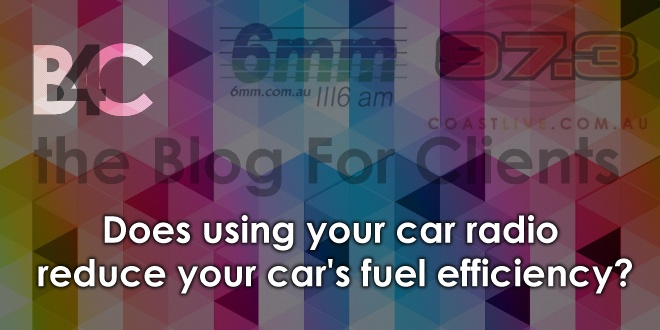"Scientific theory says that work costs energy, and that there is no free energy. So, therefore: Does your car go slower when you play the radio? If there is drag on the engine, what is the cost in mileage/energy efficiency?"
I received an email asking me is using the car radio would affect a car's fuel efficiency?
Great question and, when you get to the end you will discover that we have actually solved this myth once and for all!
First of all I wanted to know if that question is being asked by a boss/manager to try to stop their staff from using the radio in the car?
Secondly... why would you do that?
Thirdly I want to set some boundaries for my explanation, my answer is based on a standard vehicle, not a supped up car with all the fruit, like huge speakers, subwoofers, etc and the lights running around the license plates and the purple light glowing underneath - nope - just a standard vehicle, with no battery storage apart from your standard car battery.
So, how to answer this conundrum?
My first thought was that playing the radio would have no effect on mileage whatsoever. None that I could think of immediately anyway.
My reasoning went like this: Electrical power for your car is supplied by the alternator. Which, for the uninitiated is, essentially, a small generator. The alternator is powered by the fan belt which is in-turn being driven by the engine.
So, as long as the vehicle's engine is running, and the fan belt isn't slipping, and the unit itself is in good working order, then the alternator creates electrical energy. This should not be affected even if you have the radio on, the heater on, or any other electrical item on or not.
Outflow is controlled by the regulator. Some of this flow is then directed back to the car's battery, to keep it charged and to replenish the energy you sapped by starting the vehicle. In any case, what you have turned on isn't going to affect the engine's spinning or have any effect on mileage or the car's performance.
However, some of the people I work with disagreed with this working theory...
Yes, the alternator is spinning, and thus generating electricity, and that is regardless of whether any of that juice is actually being used.
This is not the case though according to them.
With no load, the alternator is simply freewheeling. Once a load is placed on the alternator, it becomes harder to turn, and the engine must do more work (and therefore must consume more petrol, effecting the total fuel efficiency) to make it do so.
You have probably experienced this yourself when you turn on the car's air-con, immediately the car drops in power, or, in a more practical sense, if you have ever used an exercise bike. These bikes drive a generator that operates the internal electronics, or if you are old school like me, a tachometer, when you click it on, it immediately becomes harder to pedal the bike. Returning to our electrical version of an exercise bike, when you increase the level, additional load is placed on the generator and the pedals become harder to turn. Same deal in a car.
So by now I am really intrigued by this question, and I then decided to talk to people in the car industry, and as we have some clients who work in the battery industry, them too. After all, who could be better, they are knowledgeable about this stuff (aren't they?), and what a debate it turned into.
I won't say which industry these people are responding from, but:
Two insisted that using your car's electrical goodies had absolutely no effect on mileage, it simply wasn't possible.
One said he wasn't sure.
Two agreed that the increased load would certainly make the alternator work harder and become more difficult to turn, but they both insisted that even in a fully loaded vehicle... the total effect on mileage would be negligible.
One even ventured a guess of about "20 to 50 cents a year in petrol to run the radio in your car, if you played it every day for 12 hours a day as you drove in normal conditions with no other equipment turned on."
Well that response had me sold, but I thought I would do some due diligence and check the inter-webs... some other websites online suggest differing answers to this question (which appears to have been around for a long while with no satisfactory answer).
The sum knowledge I can gleam from the web seems to say that any device in a vehicle that uses energy; the air conditioner, the headlights, the portable fridge, air compressor, and even the radio does reduce your mileage by some amount.
But the amount of energy consumed by a specific devise like a radio is so small as to be minuscule, that it makes absolutely no difference whatsoever.
Remember, that you can run a radio for months on a little AA battery!
However, here's something from a page entitled "101 ways to improve your gas-mileage":
7. Use electrical appliances carefully. The worst one is the rear window heater, this takes about 3 to 5%. Also remember to turn off fog lights when not needed any longer.
But, this contradicts the claim that running all the car's electrical equipment, including the rear defroster, reduces energy efficiency by a trivial amount.
You know what? I'll let the internet fight this one out...
[UPDATE:] GREAT NEWS - WE HAVE FIGURED OUT WHY PEOPLE THINK LIKE THIS AND SOLVED THIS MYTH ONCE AND FOR ALL... see HERE



